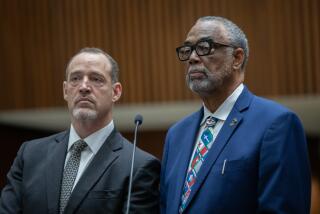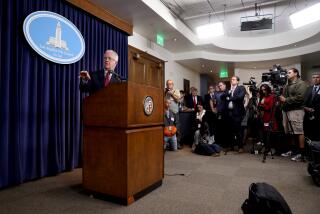Terrigno Agrees to Pay Bill, Avoids Salary Loss
- Share via
West Hollywood City Councilwoman Valerie Terrigno has agreed to repay the city for a delinquent credit card debt, thus averting the possible forfeiture of part of her salary.
Terrigno, who was convicted last week on federal embezzlement charges, ran up a $500 charge for a rental car that she used for personal, rather than city, business.
According to city officials, Terrigno, who is expected to leave office by her April 30 sentencing date, agreed this week to repay the $430 balance on the bill.
Two Notices
City officials said they had received two delinquency notices on Terrigno’s MasterCard bill from Union Bank, the lending institution that provides credit cards to all five City Council members.
After the second notice arrived last week, officials considered withholding Terrigno’s final paychecks to pay off the debt. But brief telephone negotiations between Terrigno and city officials early this week brought quick agreement.
“I think we’ve resolved the matter to the satisfaction of all parties,” said City Manager Paul Brotzman.
Council members are paid $400 a month; Terrigno is not otherwise employed.
Agreement Confirmed
Terrigno, who has declined to talk to reporters since her conviction last Friday, did not return telephone calls to her office. But her city aide, Richard LaVoie, confirmed that an agreement had been reached.
“It’s my understanding that it’s already been paid,” LaVoie said. “As far as I’m told, there’s nothing else outstanding.”
All five City Council members have been using the credit cards since last June. They were issued, Brotzman said, for two reasons.
“The cards provide a cash-advance mechanism for the council members,” he said. “It’s a lot more convenient than to keep taking out cash. And it also provides a clear paper trail for our finance people. We can go over the expenses without all the expense accounts and reports we’d have to use otherwise.”
Last July, the council allotted itself $11,850 for the year to cover meeting and travel expenses for out-of-town conferences. Some city activists have demanded that the council place strict limits on its expenses. But although the council has passed into law a policy covering the expenses of city employees, it has not come up with a policy covering its own expenses.
Terrigno’s unpaid bill became an issue last December when city finance officials received a delinquency notice from Union Bank.
Brotzman said Terrigno had reported the $500 car rental bill to city officials several months earlier. “She was the one who brought that item to our attention,” he said. “She told us she wanted to pay for that item herself.”
Delinquency Notice
But the arrival of the delinquency notice indicated that Terrigno had not been keeping up with her payments. In an internal memo to Terrigno in January, one city official warned that the city’s credit was in danger of being canceled.
At that point, according to Brotzman and Grant Lighon, a city auditor, Terrigno agreed to pay off the $500 bill in monthly payments.
City officials assumed the payments were being made until they received a second delinquency notice from the bank on March 6. “I suspect that through all the stress of preparing for her trial, she simply neglected to handle (the bill),” Brotzman said.
The three-day trial last week resulted in Terrigno’s conviction on 12 counts of embezzling $9,000 in federal funds two years ago while she headed Crossroads, a now-defunct Hollywood counseling agency.
Facing a maximum of 10 years in prison and $10,000 in fines on 11 felony counts (the 12th is a misdemeanor), Terrigno will be forced from office when U.S. District Judge Laughlin Waters renders a judgment. That judgment could come at any point through Terrigno’s scheduled sentencing on April 30, and even afterwards if there is an appeal.
Other Questions
Although the federal trial may have resolved the criminal issues in the Crossroads affair, at least one state agency has been pursuing other questions about the agency.
In recent weeks, an auditor from the state attorney general’s office has been trying to learn why the state never received annual financial reports from Crossroads. The reports are required of all corporate entities, said auditor Robert Lawson.
Lawson has also been trying to determine whether the Crossroads organization actually dissolved. “We never got any notice that they were closing up shop,” Lawson said.
More to Read
Sign up for Essential California
The most important California stories and recommendations in your inbox every morning.
You may occasionally receive promotional content from the Los Angeles Times.













